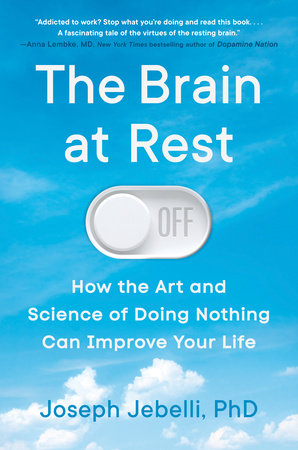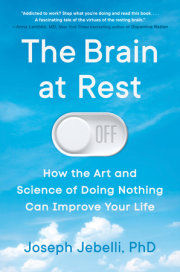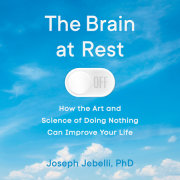Introduction
The Resting Brain
What your brain is up to when
you think you're doing nothing
Abolfazl was six years old when he first understood kār, Farsi for "work."
Standing beside his mother under the domed arches of Tehran's Grand Bazaar, he sensed it was important. Something noble.
"Kār tāj ast," his mother would say ("Work is a crown").
Around them, merchants worked tirelessly to sell everything from fruits and nuts to hand-made leather shoes, delicious spices, wooden abacuses, and exquisite hand-woven Persian rugs. Old men sat cross-legged on cushioned corners, sipping tea through cubes of sugar and sharing stories of Persian kings and poets.
Later, when he was a bit older, Abolfazl heard his father snoring through a long midday nap and felt compelled to wake him. He approached the bedroom door and reached for the handle, only to be met with a hand blocking his way. His mother gazed at him with an intensity he remembers to this day.
"Ārām hekmat ast," she said firmly ("Rest is wisdom").
Fifteen years later, Abolfazl is sitting in a small office cubicle in a high-rise tower on the outskirts of Bristol, England. The 1980s had swept him, like many of his compatriots, into a vast Iranian diaspora. With a mind for mathematics, he secured a job in computer programming, got married, had two children, and set out to make his family in Iran proud.
His days were long, punctuated by tapping keyboards, shuffling papers, and an unmistakable feeling of being watched. Interactions were minimal, often limited to terse emails and brief, impersonal meetings. The storytelling tea breaks he'd witnessed in Iran were replaced with lone trips to a vending machine or quick chats by a kettle in a cramped kitchen. This new world was efficient, yes, but desolate.
Time passed slowly, weeks blending into months, months into years. Before long, the soul-crushing monotony and exhausting tasks began to erode his mental health. What was meant to be a dream of a better life in England gradually morphed into a waking nightmare of stress and burnout.
The breaking point came one ordinary afternoon, two decades into his career, when Abolfazl, my father, came home early from another grueling day at the office. I was just fourteen at the time and could sense something amiss the moment he walked through the door. His usual tired smile was gone, replaced with a look of panic and overwhelming sorrow.
What happened next is a blur, but I do remember a shouting I had never heard before. Frantic, confused, and gravely depressed, he unleashed his frustrations on my mother, who, struggling with her own work burnout, tried to calm him down.
"You just need to rest, Ab," I remember her saying through tears.
"I don't even know how to rest anymore," he hurled back.
A smashing sound erupted.
I'm ashamed to admit it now, but I was so scared I grabbed my bike and fled.
The next day, my father quit work and never went back. The doctor diagnosed him with major depressive disorder, likely caused by overwork and burnout, handed him some pills, and told him to find time to rest-truly rest. Now he sleeps through most mornings, says very little, does very little, and tries to manage his condition one day at a time.
All because he couldn't heed his mother's advice: to lay down the crown and rest.
It took me a long time to realize the importance of rest.
When I was a research scientist at the University of Washington, I would spend my days conducting lab experiments, writing papers, and mentoring students-finishing at 7 p.m., only to head straight to a nearby coffee shop and work on grants and my first book until ten or eleven. It was exhausting, with my goals always seeming just out of reach. I often felt totally wiped out.
Looking back, I can see I was forcing myself to take on such a heavy workload because I felt an immense, self-imposed pressure to achieve. It was making me pretty miserable. But I was in that phase of my life when all the old formulas seemed so relevant. You think that the faster you run, the better you're going to do; that if you work harder and harder, you'll succeed.
Unsurprisingly, this way of life took its toll on my mental and physical health. My memory, focus, creativity, and cognitive abilities faded, making it increasingly hard to think about the problems I was hired to solve. My anxiety skyrocketed, making it difficult to concentrate on tasks and causing sleepless nights filled with racing thoughts. My energy levels plummeted, leaving me fatigued and grouchy, and my immune system weakened, causing frequent colds and headaches.
On paper I was excelling; in reality, I was a mess.
As the years went by, it became clear that I couldn't sustain this pace indefinitely. Like my father, I was heading toward burnout and a serious mental-health condition.
My brain was sending urgent signals, and it was about time I listened.
So I started to ease off work. I stopped staying late just to be seen. I stopped working while ill just to prove my dedication. I stopped going the extra mile just to look good when, in truth, no one really noticed or cared. Gradually, I began to let go of the pressure of presenteeism and the constant need to achieve. Eventually, I decided to leave academia and pursue writing full-time.
With a more relaxed attitude to work, my health has improved dramatically. I sleep better, my energy has returned, and I am ill far less often. What's more, my ability to focus, solve problems, be creative, and write fluidly has soared. Incredibly, I'm now more productive and efficient than ever before.
Rest, I have realized, is the key to my health and productivity.
But why and how is this the case? What lies behind the wisdom of rest that my grandmother encouraged all those years ago? Guided by my knowledge as a neuroscientist and driven by my family's toxic relationship with work, I started to explore the neuroscience of rest-and what I discovered was extraordinary.
Throughout history people have extolled the benefits of rest. Charles Darwin spent considerable time fishing and taking breaks alongside his studying and writing. Maya Angelou championed “a day away” for long baths, leisurely strolls, and time spent on park benches (“observing the mysterious world of ants and the canopy of treetops”). Karl Marx worked extensively, yet believed that rest would lead to a blossoming of universal creativity. Jane Austen, Virginia Woolf, and Georgia O’Keeffe valued relaxation and downtime. Leonardo da Vinci was a contemplative genius, reportedly staring at The Last Supper for hours before adding a single brushstroke and walking away.
For a long time we have been taught that such inertia is the opposite of success-an indulgent, unprincipled, even irresponsible way of behaving. But what if I told you that people often succeed in life not despite their inactivity but because of it? What if I told you that, far from being indulgent and unproductive, rest is actually the key to human flourishing?
In this book I want to show you how doing nothing has profound benefits for your brain, and that when you disengage from a task, your brain activates a network vital for your mental and physical health. We call this network the default network: a circuit of neurons (brain cells that communicate through electrical and chemical signals) that enables us to daydream, mind wander, think reflectively, and imagine the future. It fans out across the brain, occupying the frontal, parietal, and temporal lobes. Crucially, the default network is only active when we are not focused on an exerting task; when the brain is cycling through thoughts not associated with our immediate environment; when, in short, our minds simply roam free.
Activating the default network can enhance your intelligence, creativity, social empathy, and long-term productivity. It can improve your health and help stave off neurological disease. It is your brain's hidden superpower, recharging and rehabilitating your overworked mind. This astonishing new understanding of the brain is changing the way we work for the better, and redefining what it means to "think."
To see the default network in action, consider a group of eighty people who were asked to pick the best car from a set of four, based on a variety of mechanical specifications. Half of the people were given five minutes to concentrate on the task, while the other half were told to chill out, take a break, and think about unrelated things. Following the break, researchers from the University of Amsterdam found that the latter group scored far higher on the task, working through the problem in a more efficient way. Another example comes from observing fifty-two doctors and nurses working a twelve-hour night shift. Half of the team were told to take a forty-minute nap, while their colleagues worked continuously. Researchers at Stanford University found that the group that rested performed better on tests of attention and simulated medical tests, including inserting a catheter into a virtual patient. By doing nothing, they got better at doing everything.
While the time needed to tap into the benefits of the default network is still unclear, we know that people given twenty minutes’ rest during a so-called consequence test, where people are asked to list as many consequences as they can for a possible scenario, perform much better than people who do not rest. People even perform better with only ten minutes’ rest. (An example of a consequence test is asking people: “What would the results be if people no longer needed to sleep?” Possible answers include: get more done, eliminate tiredness, make alarms unnecessary, etc.) In addition, tasks involving problem-solving, spatial insight, and verbal reasoning all benefit from thirty minutes’ rest. Such tasks can be anything from calculating percentage increases to naming as many words as possible beginning with the letter “K.”
But arguably the greatest affirmation for rest comes from a recent meta-analysis-an overview of dozens or hundreds of studies-which revealed that 73 percent of all studies in the field of problem-solving report positive effects following not just thirty minutes' rest, but often after longer periods of between four and twenty-four hours. As a general rule, the more time you spend doing nothing, the better it is for your brain.
The groundwork for this extraordinary discovery was laid in the early twentieth century by the French polymath Henri Poincaré. Frustrated by the seemingly unsolvable equations he was working on, he would often spend time away from his desk to clear his head, walking through the woods or strolling along the beach on a sunny day, aimlessly letting his mind wander. A philosophical man by nature, Poincaré was forever curious about the way his mind worked, and would often talk to friends and colleagues about how he arrived at certain conclusions. When he wasn’t absorbed in one of the many subjects he studied-physics, mathematics, electromagnetism, astronomy, geology, to name a few-he would indulge in contemplation, freeing his mind to explore new ideas.
Poincaré soon came to realize that whenever he rested, the solutions to his equations would suddenly appear, unbidden and seemingly out of nowhere. Amazed and eager to discover more, he spent time aimlessly sitting on buses, wandering along country lanes, and sometimes just staring blankly at the forest outside his window. He documented the episodes in his journal, vividly recounting one such revelation while trying to solve an equation: "Disgusted with my failure, I went to spend a few days at the seaside, and thought of something else. One morning, walking on the bluff, the idea came to me, with the same characteristics of brevity, suddenness and immediate certainty." Whatever this mysterious process was, Poincaré suspected that it was somehow connected to a kind of unconscious processing in the brain. Enthused, he decided to share his discovery with colleagues at the fourth assembly of the Psychological Society of Paris on June 8, 1908. He believed the phenomenon was vital not only for mathematics but for all disciplines. He called it "sudden illumination."
In nineteenth-century France, Poincaré had little ability to study the phenomenon scientifically; his evidence amounted to self-reports, intuition, and guesswork. Science is only ever as good as the techniques of the time, and Poincaré's contemporaries were guided by rationalism, a philosophical tradition that emphasizes logic, reason, and, most importantly, empirical evidence. So Poincaré's findings were met with skepticism.
Nevertheless, it was only a matter of time before scientists realized the significance of Poincaré's discovery. Among them was the German psychiatrist Hans Berger, who in 1929 showed that the brain is constantly busy, even when a person is resting. He achieved this by inventing a technique still used by neuroscientists today: the electroencephalogram (EEG), a set of sensors placed on the scalp that record brain activity. Berger found that whenever he used an EEG on a person, their brain activity, measured in electrical signals, did not decrease when they stopped performing a task. To neurologists of the day this seemed impossible, and so Berger's findings, like Poincaré's, were treated with caution.
By the 1950s, researchers realized that they could no longer ignore this budding new field. Louis Sokoloff, an American neuroscientist, found that brain metabolism (the chemical reactions that provide us with energy) stayed the same when a person transitioned from rest to solving math problems, providing more evidence that the brain is just as active during rest. Then, in the 1970s, the Swedish neuroscientist David Ingvar made a shocking discovery that we have been trying to understand ever since. Ingvar showed that blood flow in the frontal lobe-responsible for nearly all our higher faculties including intelligence, memory, and attention-is actually at its highest not when a person is working but when they are resting. This contradicted not just prevailing science but basic common sense. How could doing nothing require more energy than doing something?
My own interest in the default network stems from when I was a PhD student at University College London. My fellow researchers and I held a weekly meeting called Journal Club, huddling for two hours to critique a scientific paper. It was a sacrosanct occasion where we could all launch our most valiant defense of science: if the data we scrutinized resisted our attempts to fault it, we knew it was good science.
At one Journal Club, my professor showed us a study from the world of neuroimaging. It used fMRI (functional magnetic resonance imaging) to look at brain activity when a person is engaged in a task-in this case, a test of verbal memory-versus not engaged in a task. As with all neuroimaging studies of this kind, the results showed parts of the brain lighting up like a city at night when engaged in a task.
Copyright © 2025 by Joseph Jebelli. All rights reserved. No part of this excerpt may be reproduced or reprinted without permission in writing from the publisher.








